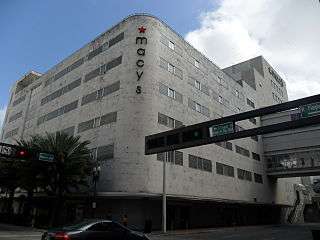Burdines
 | |
| Department store | |
| Industry | Retail |
| Fate | Acquired by Macy's |
| Founded | 1896 Bartow, Florida |
| Defunct | 2005 (renamed to Macy's) |
| Headquarters | Downtown, Miami, Florida |
| Products | Clothing, footwear, bedding, furniture, jewelry, beauty products, and housewares. |
| Parent | Federated Department Stores, Inc. |
Burdines (English pronunciation: /bɜːrˈdaɪnz/} bur-DYNZ) is a now-defunct American department store chain in the state of Florida. The original store opened in Bartow, Florida in 1896[1] as a carriage-trade shop. In the Twentieth Century, Burdines grew into a popular chain of department stores, known as 'The Florida Store,' decorated with palm trees in the center of the store, painted in pink and blue, and other subtropical colors and motifs. In 1956, the stores became a part of Federated Department Stores, Inc. (now Macy's, Inc.) On January 30, 2004, it was renamed Burdines-Macy's, and a year later, on March 6, 2005, the name Burdines was dropped altogether.
History

Beginning
In 1897, Henry Payne and William M. Burdine opened a dry goods store in the central Florida city of Bartow.[1] A year later, Payne left the company, and Burdine brought in his son, John, as a partner, resulting in the company's name change to W.M. Burdine and Son. In 1898, Burdine bought a block on South Miami Avenue, one block south of Flagler Street,[1] in the then-fledgling community of Miami. That year he opened the first W.M. Burdine & Son store at the location, just two years after the first people had arrived in the area from the newly completed Florida East Coast Railroad to incorporate the city. His tiny store held only a few shelves of clothing, which were primarily sold to construction workers, soldiers from the Spanish–American War, and the local Miccosukee and Seminole Native Americans. Burdine was amazed with the business that he did in Miami and decided to close his store in Bartow and move his operations base to Miami, changing the business name to Burdines and Sons.[1]
By 1912, under the leadership of Roddy Burdine,[3] Burdines had grown into a full-fledged department store and continued expanding. The land-boom of the 1920s helped the store launch its first branch in Miami Beach. As Florida's population soared, so did the growth of Burdines. Over the next thirty years, four other branches opened across the state of Florida.
In the late 1940s, Burdines opened an international mail order program that served Latin America. This resulted in a rise of popularity for the company, and military personnel stationed in Cuba would send a supply ship to Miami every 6 months with orders for Burdines.
1956–1996
In 1956, Burdines merged with Federated Department Stores, Inc. The financial support given by Federated allowed Burdines to push north and westward in the 1970s and 1980s, entering the markets in the cities of Orlando, Tampa, Sarasota, and St. Petersburg. In 1971, the Burdines store in Dadeland became the largest suburban department store south of New York.
In 1991, following the 1988 merger of Federated with the Allied Stores Corporation and subsequent bankruptcy reorganization, Burdines absorbed Allied's Tampa-based Maas Brothers/Jordan Marsh Florida division, converting many of the stores to Burdines and closing the rest. The conversion resulted in there being fifty-eight Burdines stores in the state of Florida.
Celebrating its 100th anniversary in 1996, Burdines sold custom-made FIESTAWARE pitchers by The Homer Laughlin China Company. The pitchers held 67.5 ounces of liquid and stood seven inches tall.
1999–2000
From 1999 to 2000, Burdines experienced major growth, expanding into seven new locations and significantly renovating their existing stores with a lighter color palette and an upgraded decor. The most publicly anticipated stores that opened during this period were those located at The Florida Mall in Orlando, Aventura Mall in Aventura (a suburb of Miami), Citrus Park Town Center in Tampa, Oviedo Marketplace in Oviedo (a suburb of Orlando), and The Mall at Wellington Green in Wellington (a suburb of West Palm Beach).
During this period, Burdines also tried another new layout at their store in St. Petersburg's Tyrone Square Mall, in an attempt to improve convenience for shoppers. The store upgraded to use a central checkout system and was expected to be more popular among shoppers since they would only need to see a cashier once before leaving. However, the design failed as an employee had to manually apply a coded sticker (identifying who made the sale) to the price tag of each item before customers left the store. Thus, this convenience plan was quickly abandoned by Burdines, and the company resumed using traditional cashier layouts.
See also
References
- 1 2 3 4 "History of Burdines" (PDF). Polk County Historical Association. June 1996. pp. 1–3. Archived from the original (PDF) on 2011-07-27. Retrieved 2010-09-26.
- ↑ http://metroatlantic.wordpress.com/2012/09/11/downtown-miami-burdines
- ↑ "History of Burdines stores chronicled in new book". tribunedigital-sunsentinel. Retrieved 2015-12-21.
External links
- Downtown Miami Burdines history
- History of Federated Department Stores including Burdines.
- Article on Burdines and other department stores that are defunct and why.
- Article on the newer style of Burdines stores.
- Old news on Burdines layoffs during Campeau acquisition of 1987.
| Records | ||
|---|---|---|
| Preceded by N/A |
Tallest building in Miami 1912–1917 |
Succeeded by Ralston Building |